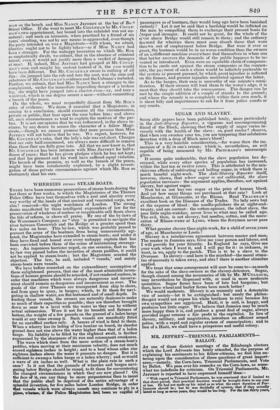SUGAR AND SLAVERY.
SOME able papers have been published lately, more particularly in the Anti-Slavery Reporter, a vigorous and uncompromising, friend of the Black, showing that the supply of sugar varies inversely with the health of the slave : so, good reader! observe, that when you sweeten your tea, you are tempering that salubrious decoction with a drop of Black man's blood ! This is a very horrible consideration,—far worse than the immersion of a fly in one's cream; which is, nevertheless, an evil capable of being measured by Mr. PRITCHARD'S microscopic glass. It seems quite undeniable, that the slave population has decreased, while every other species of population has increased, within the last ten or twelve years. This is attributed to the mischievous effects of cultivating and boiling sugar, in which there is much baneful night-work. The Anti-Slavery Reporter itself, however, shows, that where sugar is not cultivated, the slave population increases: the argument applies, therefore, not against slavery, but against sugar. Now let us not buy our sugar at the price of human blood. And yet how many things are purchased at that rate? Look at Manchester, at Gloucester, at the Rhone. Read THACKRAH'S excellent book on the Diseases of the Trades. No lady sews but at the expense of blood : the needle-polishers die at eight-andtwenty, and are content: the cotton-spinner, the infant slave, the poor little night-watcher, never lives to what may be called age. The evil, then, is not slavery, but needles, cotton, and the maceration of Rhone-water at Lyons, where the ferrymen never pass thirty.
What greater slavery than night-work, for a child of seven years of age, at Manchester or Leeds ?
' Slavery is a mischievous agreement between master and man. The master in Jamaica says, Give me your person and labour, and I will provide for your futurity. In England he says, Give me your work when I want it, and I will pay for it: in sickness, in want, in wo, apply to the parish. This is to be a slave to the Overseer. In slavery—and here is the mischief—the moral stimulus of necessity is taken away, and alas ! there is another stimulus applied.
We trust that some arrangement will soon be come to—as much for the sake of the slave-owners as the slavery-detesters. Sugar, though classed among the necessaries of life by Mr. M'CueLocn, may nevertheless be dispensed with, or used in more moderate quantities. Sugar farms have been of late bad bargains; but then, have wheat and barley farms been much better?
We would moderate. Slavery is an unmanly and a detestable vice of society—let it be extinguished: but surely the philanthropist would not expose his white brethren to ruin because his own sympathies are aggrieved. Haiti, it is said, is happy, and produces but little sugar. We believe that Jamaica may be much more happy than it is, and produce a great deal of sugar, always provided sugar returns a fair profit to the capitalist. In lieu of slavery, military, and magistrates, introduce an efficient armed police, with a rapid and regular system of emancipation; and in lieu of a Haiti, we shall have a prosperous and useful colony.


























 Previous page
Previous page